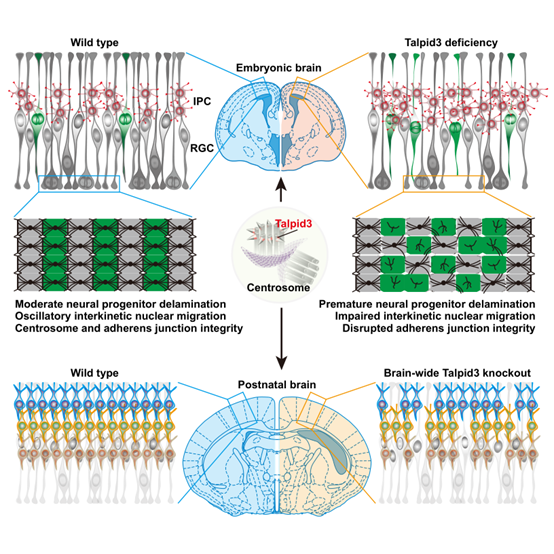12 20, 2021
Centrosome Integrity Restrains Neural Progenitor Delamination to Sustain Neurogenesis
The cerebral cortex of mammalian brain is organized into layers of specialized neuronal subtypes by orchestrated stem cell maintenance, expansion, fate commitment and differentiation. Dysfunction of Centrosomal protein Talpid3 in human predisposes the patients to Joubert syndrome, which is an autosomal recessive ciliopathy condition characterized by cerebellum and hindbrain malformation, hypotonia in infancy with laterataxia and intellectual disability. However, the molecular mechanisms underpinning the cognitive impairment in patients with Joubert syndrome and the consequences of Talpid3 dysfunction outside of cilia remain unclear.
Recently, a study published in Cell Reports, led by Dr. Qing-Feng Wu from Institute of Genetics and Developmental Biology, Chinese Academy of Sciences (CAS), revealed that Talpid3-mediated centrosome integrity maintains the anchoring of RGCs (Radial Glial Cells) to VZ (Ventricular Zone) and restrains their delamination via stabilizing adherens junctions during cortical neurogenesis.
In this study, the researchers found that Talpid3 dysfunction in RGCs predisposes them to pathological delamination and disrupts basal-to-apical nuclear migration in both cell-autonomous and cell non-autonomous manners during cortical neurogenesis. These results were confirmed in conditional Talpid3 knockout mice. Further investigation showed that loss of Talpid3 disrupts adherens junction belt, leading to pathological delamination and premature differentiation of RGCs in the embryonic brains and reduced neuronal number in the postnatal brains.
Taken together, Talpid3-mediated centrosome integrity maintains the anchoring of RGCs to VZ and regulate their delamination via stabilizing adherens junctions during cortical neurogenesis.

A schematic model showing the molecular mechanism of Talpid3 in regulating cortical neurogenesis.